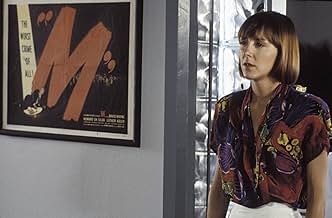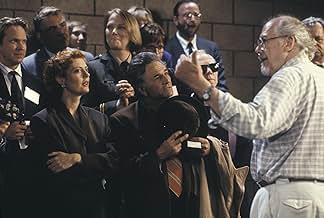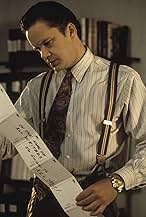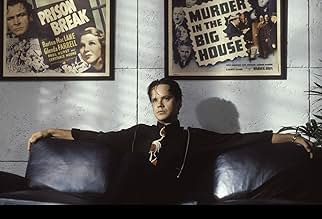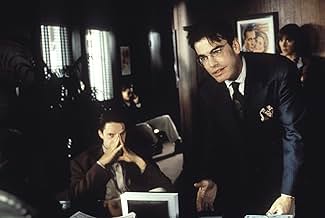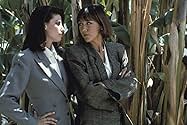A Hollywood studio executive is being sent death threats by a writer whose script he rejected, but which one?A Hollywood studio executive is being sent death threats by a writer whose script he rejected, but which one?A Hollywood studio executive is being sent death threats by a writer whose script he rejected, but which one?
- Nominated for 3 Oscars
- 24 wins & 33 nominations total
Storyline
Did you know
- TriviaThe celebrity cameos were not written in the script. Robert Altman added them all in. No scripted dialogue was given to any celebrity with a cameo.
- GoofsWhen Mill reads the newspaper story about the murder, a closeup of article reveals that it is just the same few paragraphs printed over and over.
- Quotes
Griffin Mill: It lacked certain elements that we need to market a film successfully.
June: What elements?
Griffin Mill: Suspense, laughter, violence. Hope, heart, nudity, sex. Happy endings. Mainly happy endings.
June: What about reality?
- Crazy creditsTim Robbins, Fred Ward and Cynthia Stevenson all enter the film when their names appear in the opening credits.
- Alternate versionsIn the theatrical version there was a frontal nude scene of Tim Robbins at the hotel in the desert. This scene was removed for the cable version.
Featured review
"Players only love you when they're playing." --Stevie Nicks
Griffin Mill, whose name has a kind of ersatz Hollywood feel to it (cf., D. W. Griffith/Cecil B. De Mille), is not a player with hearts so much as a player with dreams. He is a young and powerful film exec who hears thousands of movie pitches a year, but can only buy twelve. So he must do a lot of dissembling, not to mention outright lying, along with saying "We'll get back to you," etc. This is what he especially must say to writers. And sometimes they hold a grudge. In this case one of the rejected writers begins to stalk Griffin Mill and send him threatening postcards. And so the plot begins.
Tim Robbins, in a creative tour de force, plays Griffin Mill with such a delightful, ironic charm that we cannot help but identify with him even as he violates several layers of human trust. The script by Michael Tolkin smoothly combines the best elements of a thriller with a kind of Terry Southern satirical intent that keeps us totally engrossed throughout. The direction by Robert Altman is full of inside Hollywood jokes and remembrances, including cameos by dozens of Hollywood stars, some of whom get to say nasty things about producers. The scenes are well-planned and then infused with witty asides. The tampon scene at police headquarters with Whoopi Goldberg is an hilarious case in point, while the sequence of scenes from Greta Scacchi's character's house to the manslaughter scene outside the Pasadena Rialto, is wonderfully conceived and nicely cut. Also memorable is the all black and white dress dinner scene in which Cher is the only person in red, a kind of mean or silly joke, depending on your perspective. During the same scene Mill gives a little speech in which he avers that "movies are art," a statement that amounts to sardonic irony since, as a greedy producer, he cares nothing at all about art, but only about box office success. His words also form a kind of dramatic irony when one realizes that this movie itself really is a work of art. As Altman observes in a trailing clip, the movie "becomes itself." The Machiavellian ending illustrates this with an almost miraculous dovetailing. This is the kind of script that turns most screen writers Kermit-green with envy.
Incidentally, Joe Gillis, the Hollywood writer played by William Holden in Sunset Boulevard--personifying all unsuccessful screen writers--actually does call during the movie, but Mill doesn't recognize the name and has to be told he is being put on, further revealing the narrow confines of his character.
In short, this is a wonderfully clever, diabolically cynical satire of Hollywood and the movie industry. This is one of those movies that, if you care anything at all about film, you must see. Period. It is especially delicious if you hate Hollywood. It is also one of the best movies ever made about Hollywood, to be ranked up there with A Star is Born (1937) (Janet Gaynor, Fredric March); Sunset Boulevard (1950); A Star is Born (1954) (Judy Garland, James Mason); and Postcards from the Edge (1990).
I must add that in the annals of film, this has to go down as one of the best Hollywood movies not to win a single Academy Award, although it was nominated for three: Best Director, Best Adapted Screenplay and Best Editing. I suspect the Academy felt that the satire hit a little too close to home for comfort.
(Note: Over 500 of my movie reviews are now available in my book "Cut to the Chaise Lounge or I Can't Believe I Swallowed the Remote!" Get it at Amazon!)
Griffin Mill, whose name has a kind of ersatz Hollywood feel to it (cf., D. W. Griffith/Cecil B. De Mille), is not a player with hearts so much as a player with dreams. He is a young and powerful film exec who hears thousands of movie pitches a year, but can only buy twelve. So he must do a lot of dissembling, not to mention outright lying, along with saying "We'll get back to you," etc. This is what he especially must say to writers. And sometimes they hold a grudge. In this case one of the rejected writers begins to stalk Griffin Mill and send him threatening postcards. And so the plot begins.
Tim Robbins, in a creative tour de force, plays Griffin Mill with such a delightful, ironic charm that we cannot help but identify with him even as he violates several layers of human trust. The script by Michael Tolkin smoothly combines the best elements of a thriller with a kind of Terry Southern satirical intent that keeps us totally engrossed throughout. The direction by Robert Altman is full of inside Hollywood jokes and remembrances, including cameos by dozens of Hollywood stars, some of whom get to say nasty things about producers. The scenes are well-planned and then infused with witty asides. The tampon scene at police headquarters with Whoopi Goldberg is an hilarious case in point, while the sequence of scenes from Greta Scacchi's character's house to the manslaughter scene outside the Pasadena Rialto, is wonderfully conceived and nicely cut. Also memorable is the all black and white dress dinner scene in which Cher is the only person in red, a kind of mean or silly joke, depending on your perspective. During the same scene Mill gives a little speech in which he avers that "movies are art," a statement that amounts to sardonic irony since, as a greedy producer, he cares nothing at all about art, but only about box office success. His words also form a kind of dramatic irony when one realizes that this movie itself really is a work of art. As Altman observes in a trailing clip, the movie "becomes itself." The Machiavellian ending illustrates this with an almost miraculous dovetailing. This is the kind of script that turns most screen writers Kermit-green with envy.
Incidentally, Joe Gillis, the Hollywood writer played by William Holden in Sunset Boulevard--personifying all unsuccessful screen writers--actually does call during the movie, but Mill doesn't recognize the name and has to be told he is being put on, further revealing the narrow confines of his character.
In short, this is a wonderfully clever, diabolically cynical satire of Hollywood and the movie industry. This is one of those movies that, if you care anything at all about film, you must see. Period. It is especially delicious if you hate Hollywood. It is also one of the best movies ever made about Hollywood, to be ranked up there with A Star is Born (1937) (Janet Gaynor, Fredric March); Sunset Boulevard (1950); A Star is Born (1954) (Judy Garland, James Mason); and Postcards from the Edge (1990).
I must add that in the annals of film, this has to go down as one of the best Hollywood movies not to win a single Academy Award, although it was nominated for three: Best Director, Best Adapted Screenplay and Best Editing. I suspect the Academy felt that the satire hit a little too close to home for comfort.
(Note: Over 500 of my movie reviews are now available in my book "Cut to the Chaise Lounge or I Can't Believe I Swallowed the Remote!" Get it at Amazon!)
- DennisLittrell
- Aug 20, 2001
- Permalink
Details
- Release date
- Country of origin
- Language
- Also known as
- Las reglas del juego
- Filming locations
- Production companies
- See more company credits at IMDbPro
Box office
- Budget
- $8,000,000 (estimated)
- Gross US & Canada
- $21,706,101
- Opening weekend US & Canada
- $302,216
- Apr 12, 1992
- Gross worldwide
- $21,706,547
- Runtime2 hours 4 minutes
- Color
- Sound mix
- Aspect ratio
- 1.85 : 1
Contribute to this page
Suggest an edit or add missing content




